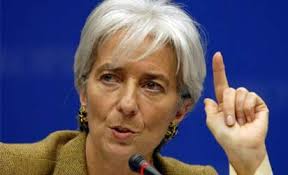As the foreign exchange market records further widening of the parallel market margin, the Director, African Department of International Monetary Fund, IMF, Antoinette Sayer, has said that measures put in place by the Central Bank of Nigeria (CBN) to restrict access to foreign exchange needs to be reviewed.
While CBN forex trading window had exchange rate stabled at N197/US $1 last week, pressure however continued to mount at the parallel market, as the naira depreciated from N224/US $1 to N250/US $1 during the week, sustaining the slide for the third consecutive week, thereby widening the exchange gap between the CBN official window and the parallel market.
The gap, according to market analysts, underscores market inefficiency.
CBN had removed 41 items from access to its foreign exchange window on grounds that they could easily be produced in Nigeria rather than spend the country’s reserves on importing them.
In the interactive session with the media, Sayer said: “The central bank has introduced administrative measures that limit access to foreign exchange and ban certain imports as a way of restricting the demand for foreign exchange.
“Those are measures that are quite detrimental, we think. It has certainly led to a lot of unhappiness in the private sector, as far as we’ve been aware, and understand that private investors see this as very detrimental to their economic activities.
“It is not something we think is sustainable or advisable. We hope that there will be an opportunity to review those restrictions and permit the exchange rate to continue to adjust.
“Of course, the exchange rate pressures in Nigeria and other oil producers has been considerable in the course of this past year because of what has happened in terms of, for example, foreign exchange earnings as oil prices have reduced those considerably, and the demand for foreign exchange continues to exert considerable pressure on their exchange rates.
“In the case of Nigeria, of course, a number of other factors have been at play. Those, of course, include in the run up to the elections: some uncertainties about what the possible outcome of those elections would be.
“Since the elections, there has been continued uncertainty about the policy direction that the current administration is going to take, the waiting for a cabinet, and the vision and plans for pursuing the reform effort and what can be expected from that.
“It is certainly the case that there are a number of factors that have led to pressures on the Naira. In response, of course, the exchange rate, being an important instrument of adjustment in countries that have a flexible exchange rate, we think it is appropriate to allow the exchange rate to depreciate, with a view to helping to contain the demand for more foreign exchange and to help contain the level of imports that was not sustainable in light of the shock to the Nigerian economy.
“The exchange rate plays a very important role there. There are countries that do not have the exchange rate and as a result have an even more arduous burden of adjustment on the fiscal side.
“That is what Nigeria and other countries that have an exchange rate can avoid. So we think it is appropriate to have the exchange rate adjust.”
Copyright Ships & Ports Ltd. Permission to use quotations from this article is granted subject to appropriate credit given to www.shipsandports.com.ng as the source.

